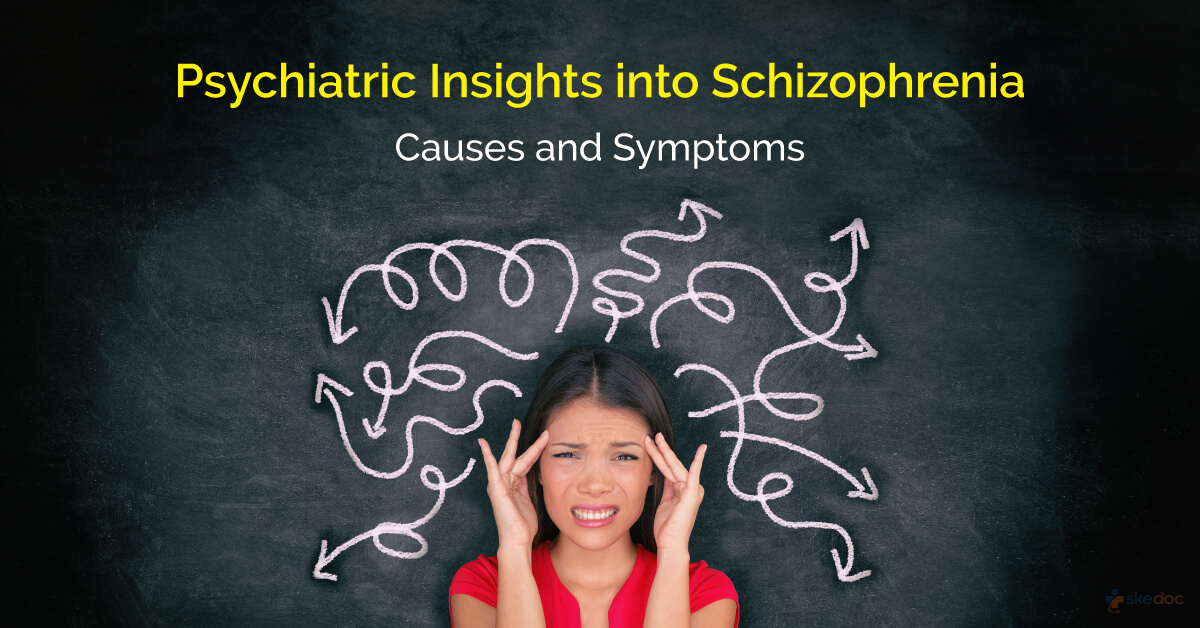Allergy
Blood Diseases
Bone & Joints
Brain
Cancer
Child Care
Cosmetic Surgery
Diabetes
Endocrinology
ENT
Eye
Gen Medicine
General Surgery
Heart
Kidney
Lifestyle
Liver & Digestive
Lung
Men’s Health
Mental health
Physiotherapy
Rheumatology
Skin and hair
Sleep Disorders
Spine
Transplant
Women Health
Thyroid
Vascular Surgery
Psychiatric Insights into Schizophrenia-Causes and Symptoms

What is Schizophrenia?
Schizophrenia is a complex and debilitating mental disorder that profoundly affects a person's thoughts, emotions, perceptions, and behaviors. As a psychiatrist, it's essential to understand the intricacies of this disorder to provide accurate diagnosis, treatment, and support for individuals grappling with its challenges.
Symptoms
Characterized by a range of symptoms, schizophrenia often emerges in late adolescence or early adulthood. These symptoms can be categorized into three main groups: positive, negative, and cognitive symptoms.
Positive symptoms
It includes hallucinations, delusions, disorganized thinking, and disorganized or abnormal motor behavior. Hallucinations involve perceiving things that are not present, commonly auditory in nature. Delusions are false beliefs that often involve paranoia, grandiosity, or persecution. Disorganized thinking is evident through disjointed speech and difficulty organizing thoughts. Disorganized or abnormal motor behavior may manifest as agitation or unpredictable movements.
Negative symptoms
Negative symptoms, on the other hand, reflect deficits in emotional expression, motivation, and social functioning. Affective flattening leads to reduced emotional expression, anhedonia causes a diminished ability to experience pleasure, and avolition results in decreased motivation to initiate tasks. Individuals with schizophrenia might struggle with social withdrawal and have difficulty maintaining relationships.
Cognitive symptoms
It impacts thinking processes and contributes to impaired decision-making, attention, and memory. These symptoms can make it challenging for individuals to focus, process information, and reason effectively. They might struggle with memory recall, abstract thinking, and problem-solving.
Causes
- The exact causes of schizophrenia remain elusive, but research suggests a multifactorial origin involving genetics, brain chemistry, and environmental factors.
- Genetic predisposition plays a significant role, as individuals with a family history of schizophrenia are at a higher risk of developing the disorder.
- Dopamine dysregulation in the brain's limbic system is associated with positive symptoms, while abnormalities in the prefrontal cortex are linked to negative and cognitive symptoms.
Risk Factors
- Stressful life events, prenatal exposure to infections or malnutrition, and drug use during adolescence can increase the risk of developing schizophrenia in vulnerable individuals.
- Neurodevelopmental factors, such as disruptions in brain maturation and synaptic pruning during adolescence, have also been implicated.
Diagnosis
Early detection and intervention are crucial for managing schizophrenia effectively. Diagnosis is primarily clinical and relies on evaluating the presence and duration of symptoms.
Treatment
Collaborative efforts between mental health professionals, caregivers, and patients are essential to developing comprehensive treatment plans.
- Antipsychotic medications are the cornerstone of pharmacological treatment, targeting dopamine receptor activity to alleviate positive symptoms. However, they may not fully address negative and cognitive symptoms.
- Psychosocial interventions play a vital role in improving overall functioning and quality of life.
- Cognitive behavioral therapy (CBT) can help individuals manage delusions and hallucinations by challenging distorted thinking patterns.
- Social skills training assists in enhancing interpersonal relationships and communication.
- Family therapy fosters understanding and support within the patient's immediate environment.
- Recovery-oriented approaches emphasize the individual's potential for growth and improvement, focusing on enhancing coping skills, building resilience, and setting achievable goals.
- Peer support groups and vocational rehabilitation programs foster a sense of community and purpose.
Long-term management involves regular follow-up appointments to monitor medication effectiveness, address side effects, and adjust treatment plans as needed. A multidisciplinary approach involving psychiatrists, psychologists, social workers, and occupational therapists ensures a comprehensive continuum of care.
Despite the challenges associated with schizophrenia, many individuals can substantially improve symptoms and quality of life with the appropriate support and treatment. However, relapses can occur, highlighting the need for ongoing monitoring and intervention.
Conclusion
In conclusion, schizophrenia is a complex mental disorder characterized by symptoms that significantly impact a person's thoughts, emotions, perceptions, and behaviors. As a psychiatrist, understanding the positive, negative, and cognitive symptoms and the potential causes and risk factors is essential for accurate diagnosis and effective treatment. A combination of pharmacological and psychosocial interventions, alongside a recovery-oriented approach, offers the best chance for individuals with schizophrenia to manage their symptoms and achieve a fulfilling life. Ongoing research and collaborative efforts continue to enhance our understanding of this disorder and improve the outcomes for those affected.
Was this article helpful?
YesNo




